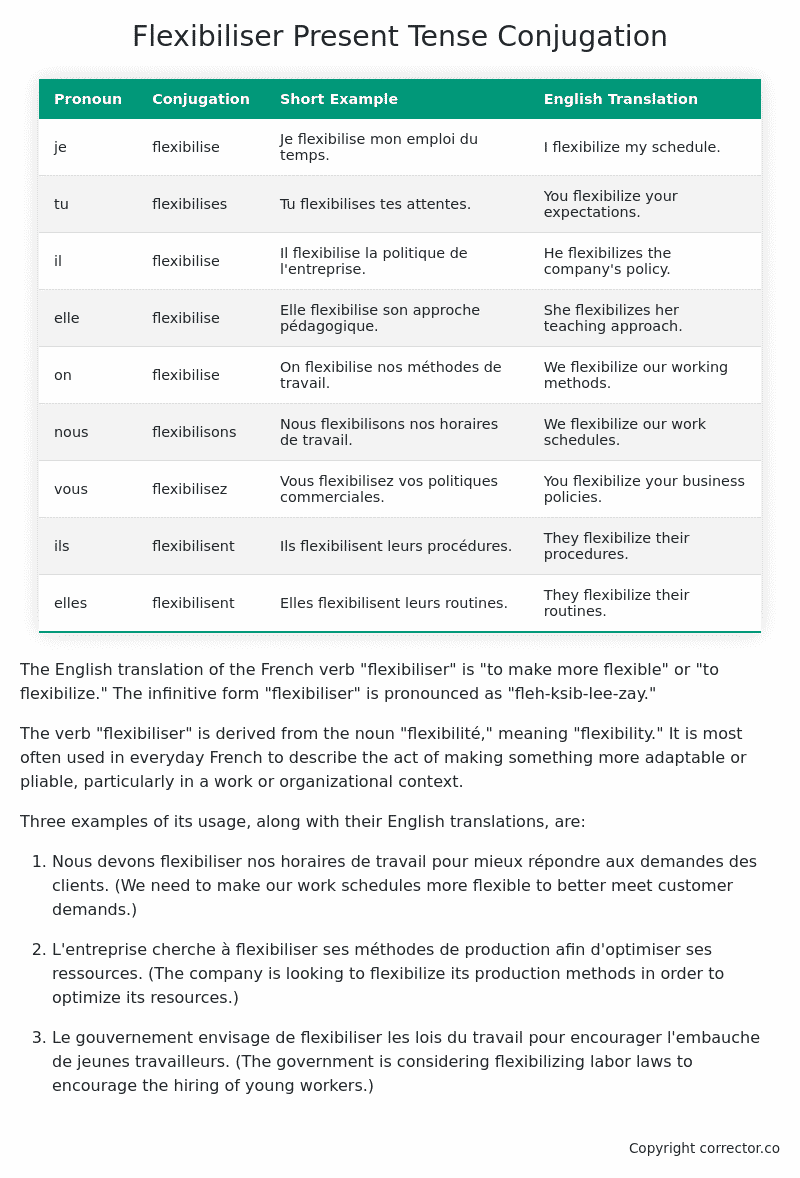Le Present (Present Tense) Conjugation of the French Verb flexibiliser
Introduction to the verb flexibiliser
The English translation of the French verb “flexibiliser” is “to make more flexible” or “to flexibilize.” The infinitive form “flexibiliser” is pronounced as “fleh-ksib-lee-zay.”
The verb “flexibiliser” is derived from the noun “flexibilité,” meaning “flexibility.” It is most often used in everyday French to describe the act of making something more adaptable or pliable, particularly in a work or organizational context.
Three examples of its usage, along with their English translations, are:
-
Nous devons flexibiliser nos horaires de travail pour mieux répondre aux demandes des clients.
(We need to make our work schedules more flexible to better meet customer demands.) -
L’entreprise cherche à flexibiliser ses méthodes de production afin d’optimiser ses ressources.
(The company is looking to flexibilize its production methods in order to optimize its resources.) -
Le gouvernement envisage de flexibiliser les lois du travail pour encourager l’embauche de jeunes travailleurs.
(The government is considering flexibilizing labor laws to encourage the hiring of young workers.)
Flexibiliser – About the French Present Tense
To take a deep dive into all the French tenses then see our article on Mastering French Tense Conjugation.
Common Everyday Usage Patterns For Le Present
Interactions with Other Tenses
Table of the Present Tense Conjugation of flexibiliser
| Pronoun | Conjugation | Short Example | English Translation |
|---|---|---|---|
| je | flexibilise | Je flexibilise mon emploi du temps. | I flexibilize my schedule. |
| tu | flexibilises | Tu flexibilises tes attentes. | You flexibilize your expectations. |
| il | flexibilise | Il flexibilise la politique de l’entreprise. | He flexibilizes the company’s policy. |
| elle | flexibilise | Elle flexibilise son approche pédagogique. | She flexibilizes her teaching approach. |
| on | flexibilise | On flexibilise nos méthodes de travail. | We flexibilize our working methods. |
| nous | flexibilisons | Nous flexibilisons nos horaires de travail. | We flexibilize our work schedules. |
| vous | flexibilisez | Vous flexibilisez vos politiques commerciales. | You flexibilize your business policies. |
| ils | flexibilisent | Ils flexibilisent leurs procédures. | They flexibilize their procedures. |
| elles | flexibilisent | Elles flexibilisent leurs routines. | They flexibilize their routines. |
Other Conjugations for Flexibiliser.
Le Present (Present Tense) Conjugation of the French Verb flexibiliser (You’re reading it right now!)
Imparfait (Imperfect) Tense Conjugation of the French Verb flexibiliser
Passé Simple (Simple Past) Tense Conjugation of the French Verb flexibiliser
Passé Composé (Present Perfect) Tense Conjugation of the French Verb flexibiliser
Futur Simple (Simple Future) Tense Conjugation of the French Verb flexibiliser
Futur Proche (Near Future) Tense Conjugation of the French Verb flexibiliser
Plus-que-parfait (Pluperfect) Tense Conjugation of the French Verb flexibiliser
Passé Antérieur (Past Anterior) Tense Conjugation of the French Verb flexibiliser
Futur Antérieur (Future Anterior) Tense Conjugation of the French Verb flexibiliser
Subjonctif Présent (Subjunctive Present) Tense Conjugation of the French Verb flexibiliser
Subjonctif Passé (Subjunctive Past) Tense Conjugation of the French Verb flexibiliser
Subjonctif Imparfait (Subjunctive Imperfect) Tense Conjugation of the French Verb flexibiliser
Conditionnel Présent (Conditional Present) Tense Conjugation of the French Verb flexibiliser
Conditionnel Passé (Conditional Past) Tense Conjugation of the French Verb flexibiliser
Conditionnel Passé II (Conditional Past II) Tense Conjugation of the French Verb flexibiliser
L’impératif Présent (Imperative Present) Tense Conjugation of the French Verb flexibiliser
L’impératif Passé (Imperative Past) Tense Conjugation of the French Verb flexibiliser
L’infinitif Présent (Infinitive Present) Tense Conjugation of the French Verb flexibiliser
L’infinitif Passé (Infinitive Past) Tense Conjugation of the French Verb flexibiliser
Le Participe Présent (Present Participle) Tense Conjugation of the French Verb flexibiliser
Le Participe Passé (Past Participle) Tense Conjugation of the French Verb flexibiliser
Struggling with French verbs or the language in general? Why not use our free French Grammar Checker – no registration required!
Get a FREE Download Study Sheet of this Conjugation 🔥
Simply right click the image below, click “save image” and get your free reference for the flexibiliser present tense conjugation!

I hope you enjoyed this article on the verb flexibiliser. Still in a learning mood? Check out another TOTALLY random French verb present conjugation!


